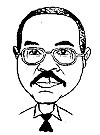In Kinyarwanda, it’s “Ubugabo si ubutumbi.”(A man is not defined by his fat). In English, Samuel Langhorne Clemens (better known as Mark Twain), the 20th century American author and humorist, said it aptly and no one can put it better: “It’s not the size of the dog in the fight [that matters], it’s the size of the fight in the dog.”


In Kinyarwanda, it’s "Ubugabo si ubutumbi.”(A man is not defined by his fat). In English, Samuel Langhorne Clemens (better known as Mark Twain), the 20th century American author and humorist, said it aptly and no one can put it better: "It’s not the size of the dog in the fight [that matters], it’s the size of the fight in the dog.”
Looking at me today, you wouldn’t believe that I was as agile and protective as the lady you espied last 4th July 2011. This was during the Liberation Day celebrations that took place at Amahoro National Stadium, in Kigali. If you didn’t watch the ceremonies, there was a sketch in which a gentleman and his ‘date’ are ambushed by ‘ruffians’. When the ruffians attack, the drama that ensues leaves the spectators laughing themselves into stitches.
As this couple saunters along, waving to the innocent-looking men by the wayside, two of the men get up behind them and try to snatch the lady’s handbag. The frail-looking lady, like a coiled rattlesnake, becomes a lethal weapon, ready to kill. Using handbag, arms and legs to knock the hooligans against one another, she floors everyone and the man is only left with the minor job of assisting her. It was only a piece of drama, of course.
In my youth, such scenes used to be a daily, reality occurrence, even if they used to play out differently. There was this day in 1961, for instance. We were back on the Rwandan side of Canika, from exile on the Ugandan side, in Bufumbira. We had moved back to participate in a referendum that’d decide whether Rwanda would be an independent republic. The final decision was on a republic, but that meant back into exile again.
The Belgians were playing roulette with us, hoping to extend their colonial rule. Our former neighbours, unaware of this, welcomed us back into Rwanda in the belief that we were back for good. However, there was a bit of a problem as some Rwandans imported from other parts of the country had destroyed our house. In the end, our former neighbours decided that one of the families would be sheltered elsewhere so as to make room for us.
So, we occupied Mudasobwa’s home for the time we were back in Rwanda. It is as residents of Mudasobwa’s home that our herdsman and I one afternoon set off to take the cattle to the watering well. Watering cattle involved fetching water from a tap and filling a kind of trough that had been dug and shaped in the ground. As we were almost filling the trough, a shout came from a contingent of herdsmen warning us against watering our cattle.
Sensing danger, Ntibikwira, our herdsman, picked up his pair of umuzo sticks as he shouted to me: "Fata inkoni zawe sha!” I quickly dropped the container I was holding and did his bidding, picking my own umuzo sticks that lay in the grass at a distance. The burly herdsmen ignored me and all pounced on Ntibikwira, raining stick blows on him, most of which missed their mark. As Ntibikwira shielded with one stick, he attacked with the other at a speed that dazzled them all.
Even then, he was careful not to hit the temple, nyiramivumbi, as he knew that one blow was enough to kill the strongest of them. On my part, knowing that I was too tiny to reach any upper part of the body, I went for the next weakest spot: the ankle. Any seasoned herdsman worth his umuzo will tell you that there is no better part to render an adversary immobile. So, whenever I saw one move back as Ntibikwira hit, I approached from behind and gave a strong blow to the ankle.
One blow and the victim sent out a shriek, as he clutched his ankle, hopping on one leg and then settling down to nurse his ankle and the sores inflicted by Ntibikwira. After thus immobilising three men, a fourth one came for me, limping but still able to run. I swiftly went up a hill and settled on the top, where luckily there was a good supply of stones. When he attempted to climb the hill, I got a stone with sharp edges, isarabwayi, and aimed for the forehead. When the stone connected, a spurt of blood shot up and the man limped back to his comrades, bloody forehead in his hands.
By this time, Ntibikwira had trounced the remaining two herdsmen and they were sitting down with their fellow hooligans. He called out for me to come down so that we could chase them away. When they saw that we were going to beat them again, they hobbled off, pleading with us not to give them such hiding again. Not wanting anything serious to happen to the victim of my stone-fling, however, I asked Ntibikwira to assist me so that we could rub some herbs (inyabarasanya) on the open wound.
Pushed against the wall, anyone is capable of anything.
E-mail: ingina2@yahoo.co.uk


